Management and Operations Report: Unilever's Strategic Analysis
VerifiedAdded on 2023/01/13
|13
|4680
|25
Report
AI Summary
This report provides a comprehensive analysis of Unilever's management and operations. It begins with an introduction to the concepts of management and operations within an organization, highlighting their significance in achieving goals and objectives. The report then delves into various management theories, including classical, behavioral, and contingency theories, and their application within Unilever. A key focus is the distinction between the roles of a leader and a manager, with an exploration of their functions in different situations, such as new product launches and conflict management. The report further examines leadership theories like trait, contingency, transformational, transactional, and action-centered leadership, along with the hard and soft skills essential for effective management. Finally, the report discusses the dimensions of the contemporary business environment and the importance of stakeholder relationships for Unilever. The report concludes by summarizing the key findings and providing references.
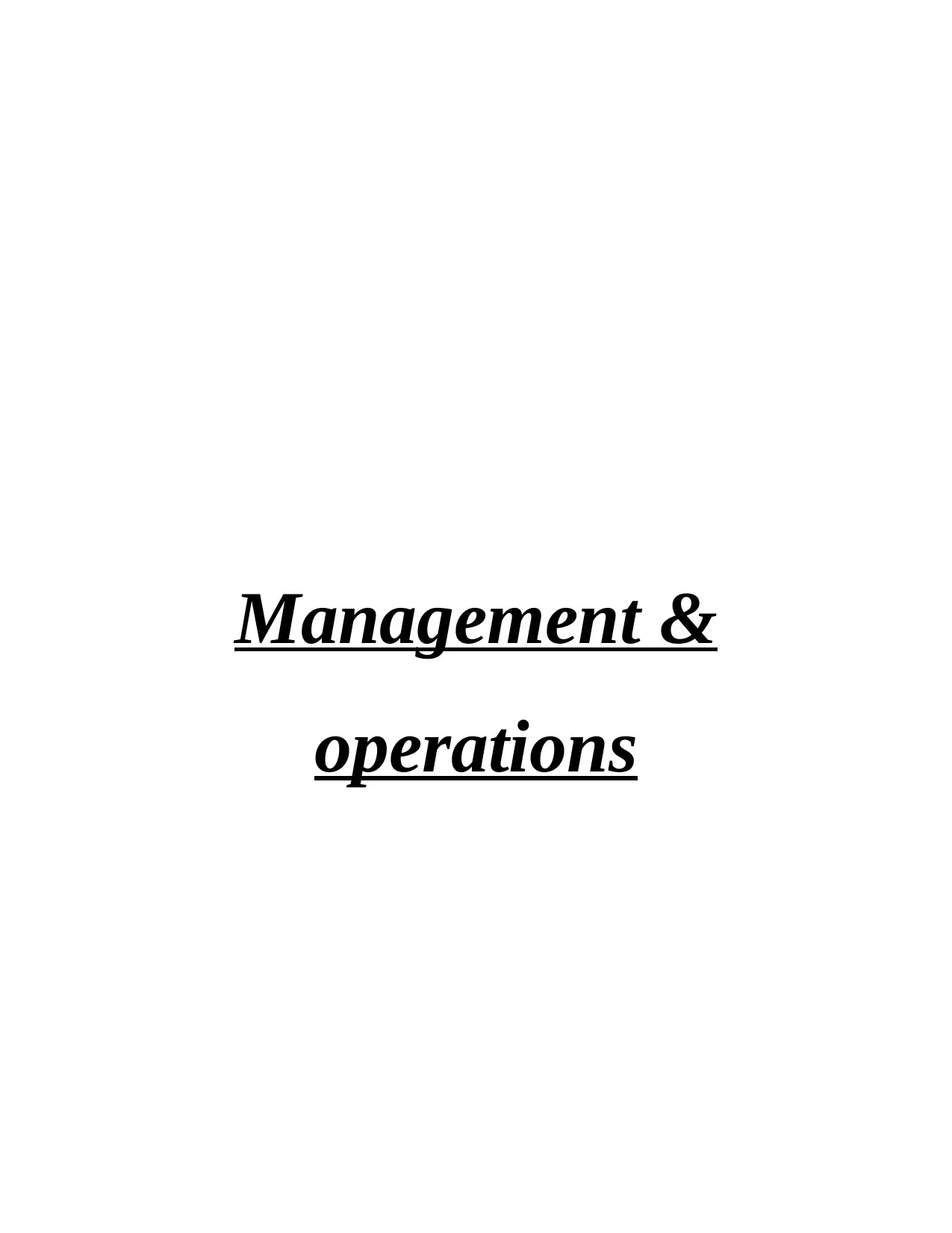
Management &
operations
operations
Paraphrase This Document
Need a fresh take? Get an instant paraphrase of this document with our AI Paraphraser
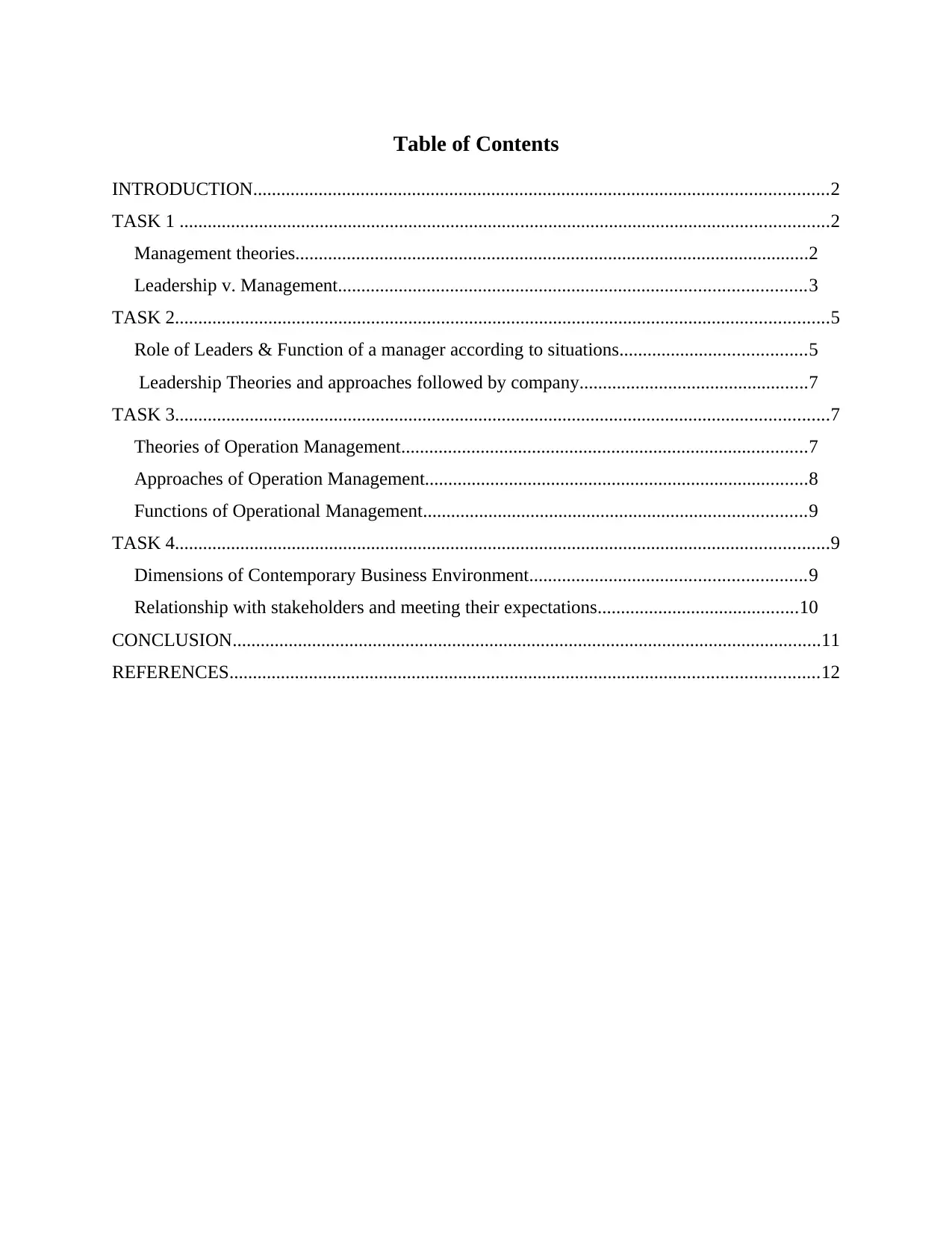
Table of Contents
INTRODUCTION...........................................................................................................................2
TASK 1 ...........................................................................................................................................2
Management theories..............................................................................................................2
Leadership v. Management....................................................................................................3
TASK 2............................................................................................................................................5
Role of Leaders & Function of a manager according to situations........................................5
Leadership Theories and approaches followed by company.................................................7
TASK 3............................................................................................................................................7
Theories of Operation Management.......................................................................................7
Approaches of Operation Management..................................................................................8
Functions of Operational Management..................................................................................9
TASK 4............................................................................................................................................9
Dimensions of Contemporary Business Environment...........................................................9
Relationship with stakeholders and meeting their expectations...........................................10
CONCLUSION..............................................................................................................................11
REFERENCES..............................................................................................................................12
INTRODUCTION...........................................................................................................................2
TASK 1 ...........................................................................................................................................2
Management theories..............................................................................................................2
Leadership v. Management....................................................................................................3
TASK 2............................................................................................................................................5
Role of Leaders & Function of a manager according to situations........................................5
Leadership Theories and approaches followed by company.................................................7
TASK 3............................................................................................................................................7
Theories of Operation Management.......................................................................................7
Approaches of Operation Management..................................................................................8
Functions of Operational Management..................................................................................9
TASK 4............................................................................................................................................9
Dimensions of Contemporary Business Environment...........................................................9
Relationship with stakeholders and meeting their expectations...........................................10
CONCLUSION..............................................................................................................................11
REFERENCES..............................................................................................................................12
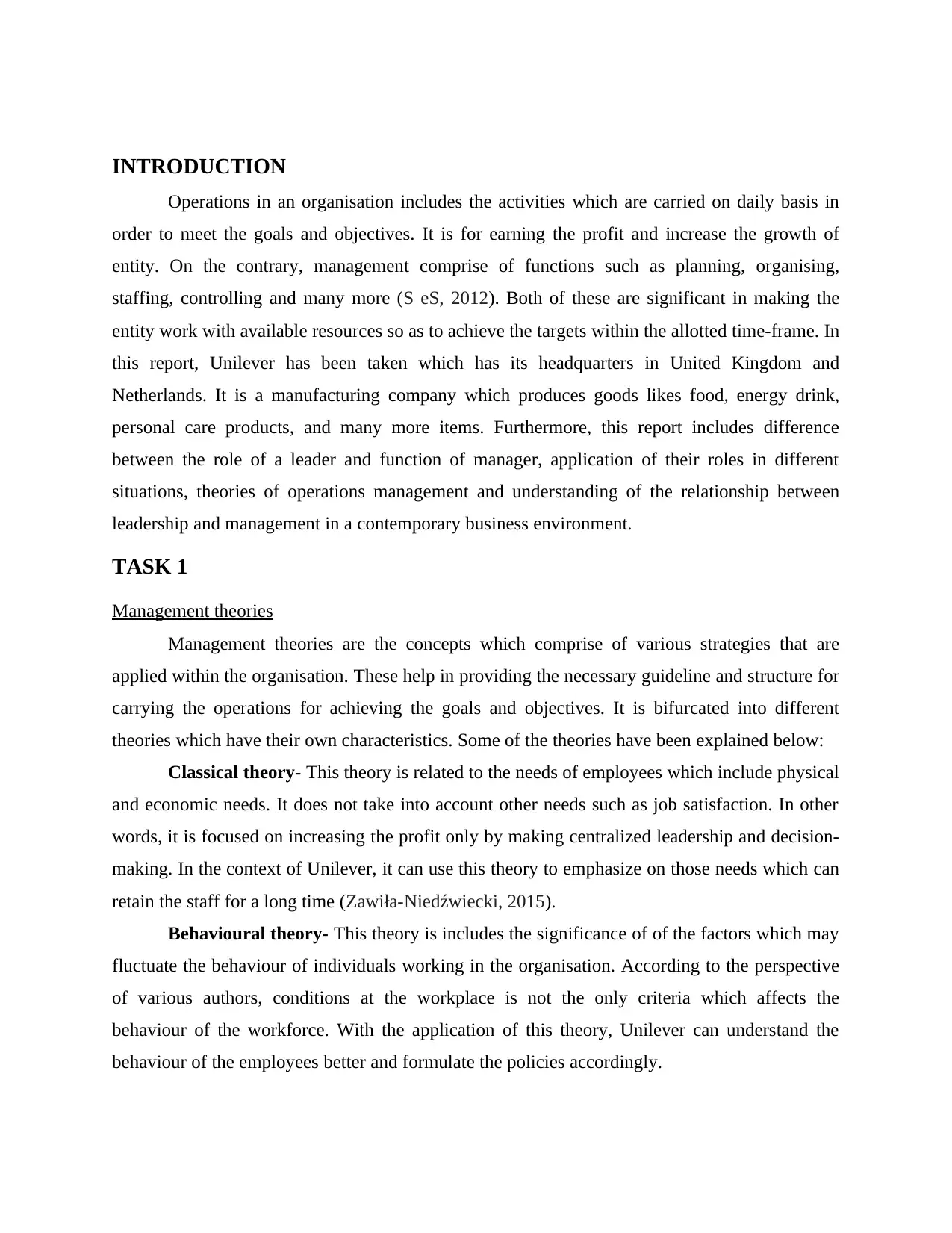
INTRODUCTION
Operations in an organisation includes the activities which are carried on daily basis in
order to meet the goals and objectives. It is for earning the profit and increase the growth of
entity. On the contrary, management comprise of functions such as planning, organising,
staffing, controlling and many more (S eS, 2012). Both of these are significant in making the
entity work with available resources so as to achieve the targets within the allotted time-frame. In
this report, Unilever has been taken which has its headquarters in United Kingdom and
Netherlands. It is a manufacturing company which produces goods likes food, energy drink,
personal care products, and many more items. Furthermore, this report includes difference
between the role of a leader and function of manager, application of their roles in different
situations, theories of operations management and understanding of the relationship between
leadership and management in a contemporary business environment.
TASK 1
Management theories
Management theories are the concepts which comprise of various strategies that are
applied within the organisation. These help in providing the necessary guideline and structure for
carrying the operations for achieving the goals and objectives. It is bifurcated into different
theories which have their own characteristics. Some of the theories have been explained below:
Classical theory- This theory is related to the needs of employees which include physical
and economic needs. It does not take into account other needs such as job satisfaction. In other
words, it is focused on increasing the profit only by making centralized leadership and decision-
making. In the context of Unilever, it can use this theory to emphasize on those needs which can
retain the staff for a long time (Zawiła-Niedźwiecki, 2015).
Behavioural theory- This theory is includes the significance of of the factors which may
fluctuate the behaviour of individuals working in the organisation. According to the perspective
of various authors, conditions at the workplace is not the only criteria which affects the
behaviour of the workforce. With the application of this theory, Unilever can understand the
behaviour of the employees better and formulate the policies accordingly.
Operations in an organisation includes the activities which are carried on daily basis in
order to meet the goals and objectives. It is for earning the profit and increase the growth of
entity. On the contrary, management comprise of functions such as planning, organising,
staffing, controlling and many more (S eS, 2012). Both of these are significant in making the
entity work with available resources so as to achieve the targets within the allotted time-frame. In
this report, Unilever has been taken which has its headquarters in United Kingdom and
Netherlands. It is a manufacturing company which produces goods likes food, energy drink,
personal care products, and many more items. Furthermore, this report includes difference
between the role of a leader and function of manager, application of their roles in different
situations, theories of operations management and understanding of the relationship between
leadership and management in a contemporary business environment.
TASK 1
Management theories
Management theories are the concepts which comprise of various strategies that are
applied within the organisation. These help in providing the necessary guideline and structure for
carrying the operations for achieving the goals and objectives. It is bifurcated into different
theories which have their own characteristics. Some of the theories have been explained below:
Classical theory- This theory is related to the needs of employees which include physical
and economic needs. It does not take into account other needs such as job satisfaction. In other
words, it is focused on increasing the profit only by making centralized leadership and decision-
making. In the context of Unilever, it can use this theory to emphasize on those needs which can
retain the staff for a long time (Zawiła-Niedźwiecki, 2015).
Behavioural theory- This theory is includes the significance of of the factors which may
fluctuate the behaviour of individuals working in the organisation. According to the perspective
of various authors, conditions at the workplace is not the only criteria which affects the
behaviour of the workforce. With the application of this theory, Unilever can understand the
behaviour of the employees better and formulate the policies accordingly.
⊘ This is a preview!⊘
Do you want full access?
Subscribe today to unlock all pages.

Trusted by 1+ million students worldwide
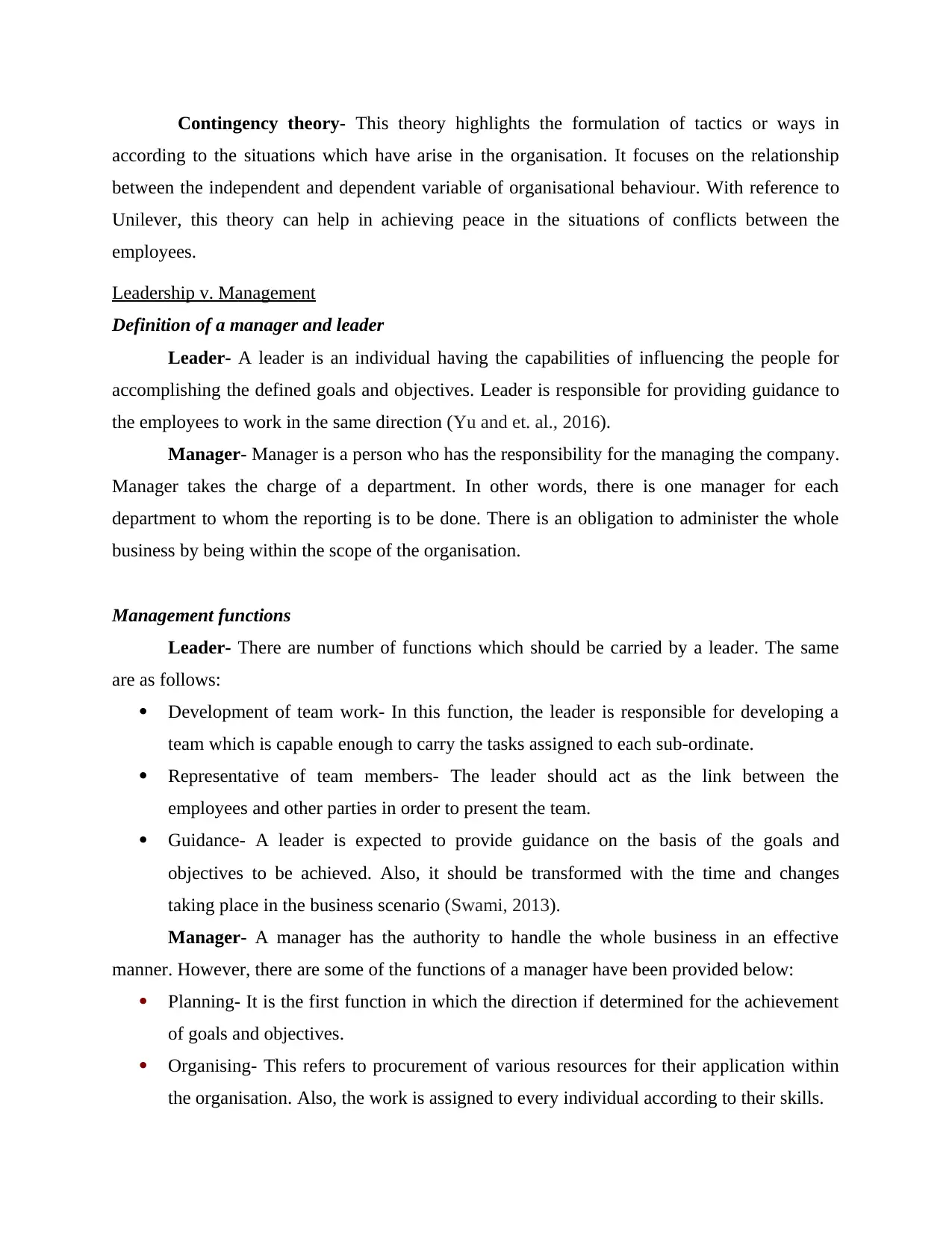
Contingency theory- This theory highlights the formulation of tactics or ways in
according to the situations which have arise in the organisation. It focuses on the relationship
between the independent and dependent variable of organisational behaviour. With reference to
Unilever, this theory can help in achieving peace in the situations of conflicts between the
employees.
Leadership v. Management
Definition of a manager and leader
Leader- A leader is an individual having the capabilities of influencing the people for
accomplishing the defined goals and objectives. Leader is responsible for providing guidance to
the employees to work in the same direction (Yu and et. al., 2016).
Manager- Manager is a person who has the responsibility for the managing the company.
Manager takes the charge of a department. In other words, there is one manager for each
department to whom the reporting is to be done. There is an obligation to administer the whole
business by being within the scope of the organisation.
Management functions
Leader- There are number of functions which should be carried by a leader. The same
are as follows:
Development of team work- In this function, the leader is responsible for developing a
team which is capable enough to carry the tasks assigned to each sub-ordinate.
Representative of team members- The leader should act as the link between the
employees and other parties in order to present the team.
Guidance- A leader is expected to provide guidance on the basis of the goals and
objectives to be achieved. Also, it should be transformed with the time and changes
taking place in the business scenario (Swami, 2013).
Manager- A manager has the authority to handle the whole business in an effective
manner. However, there are some of the functions of a manager have been provided below:
Planning- It is the first function in which the direction if determined for the achievement
of goals and objectives.
Organising- This refers to procurement of various resources for their application within
the organisation. Also, the work is assigned to every individual according to their skills.
according to the situations which have arise in the organisation. It focuses on the relationship
between the independent and dependent variable of organisational behaviour. With reference to
Unilever, this theory can help in achieving peace in the situations of conflicts between the
employees.
Leadership v. Management
Definition of a manager and leader
Leader- A leader is an individual having the capabilities of influencing the people for
accomplishing the defined goals and objectives. Leader is responsible for providing guidance to
the employees to work in the same direction (Yu and et. al., 2016).
Manager- Manager is a person who has the responsibility for the managing the company.
Manager takes the charge of a department. In other words, there is one manager for each
department to whom the reporting is to be done. There is an obligation to administer the whole
business by being within the scope of the organisation.
Management functions
Leader- There are number of functions which should be carried by a leader. The same
are as follows:
Development of team work- In this function, the leader is responsible for developing a
team which is capable enough to carry the tasks assigned to each sub-ordinate.
Representative of team members- The leader should act as the link between the
employees and other parties in order to present the team.
Guidance- A leader is expected to provide guidance on the basis of the goals and
objectives to be achieved. Also, it should be transformed with the time and changes
taking place in the business scenario (Swami, 2013).
Manager- A manager has the authority to handle the whole business in an effective
manner. However, there are some of the functions of a manager have been provided below:
Planning- It is the first function in which the direction if determined for the achievement
of goals and objectives.
Organising- This refers to procurement of various resources for their application within
the organisation. Also, the work is assigned to every individual according to their skills.
Paraphrase This Document
Need a fresh take? Get an instant paraphrase of this document with our AI Paraphraser
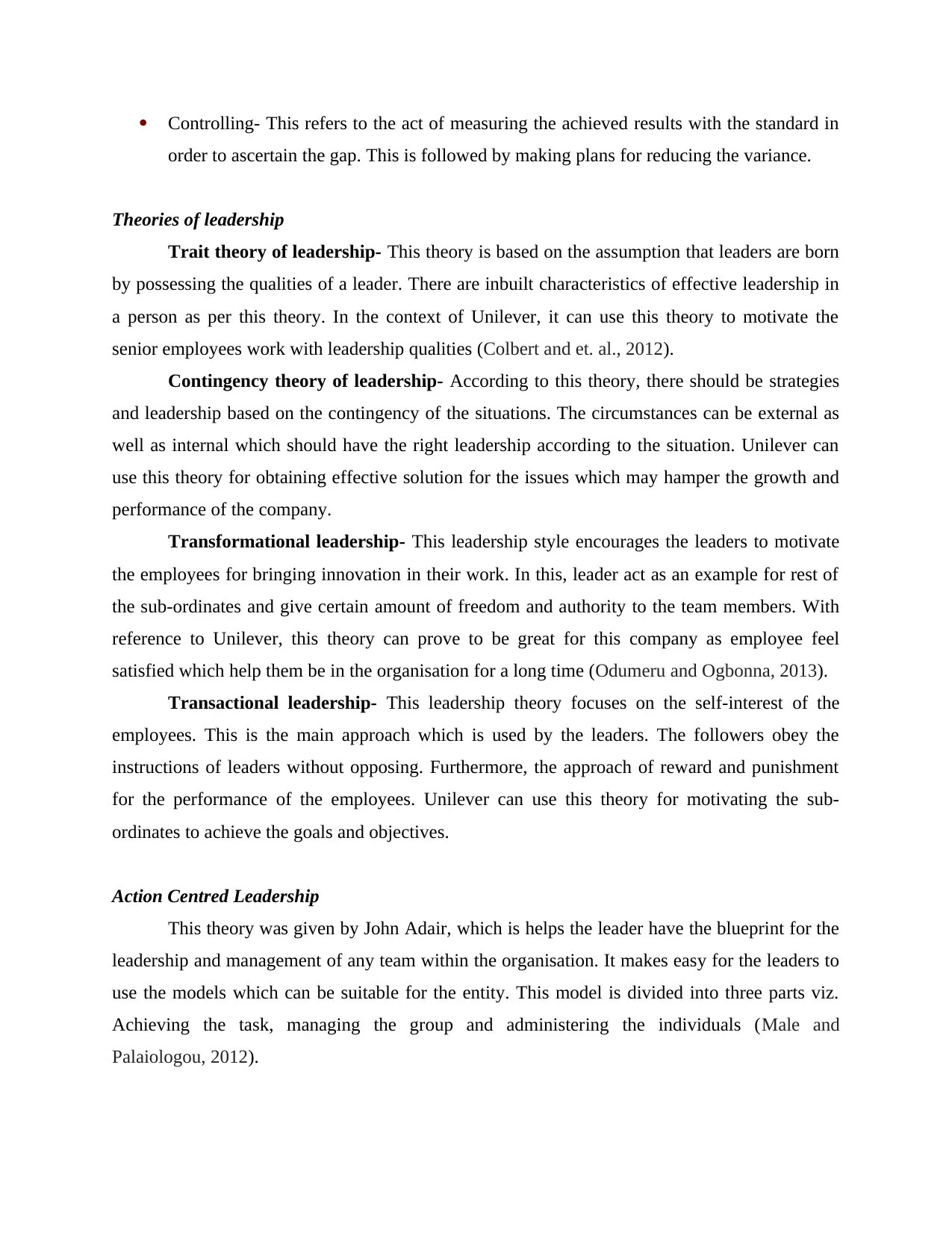
Controlling- This refers to the act of measuring the achieved results with the standard in
order to ascertain the gap. This is followed by making plans for reducing the variance.
Theories of leadership
Trait theory of leadership- This theory is based on the assumption that leaders are born
by possessing the qualities of a leader. There are inbuilt characteristics of effective leadership in
a person as per this theory. In the context of Unilever, it can use this theory to motivate the
senior employees work with leadership qualities (Colbert and et. al., 2012).
Contingency theory of leadership- According to this theory, there should be strategies
and leadership based on the contingency of the situations. The circumstances can be external as
well as internal which should have the right leadership according to the situation. Unilever can
use this theory for obtaining effective solution for the issues which may hamper the growth and
performance of the company.
Transformational leadership- This leadership style encourages the leaders to motivate
the employees for bringing innovation in their work. In this, leader act as an example for rest of
the sub-ordinates and give certain amount of freedom and authority to the team members. With
reference to Unilever, this theory can prove to be great for this company as employee feel
satisfied which help them be in the organisation for a long time (Odumeru and Ogbonna, 2013).
Transactional leadership- This leadership theory focuses on the self-interest of the
employees. This is the main approach which is used by the leaders. The followers obey the
instructions of leaders without opposing. Furthermore, the approach of reward and punishment
for the performance of the employees. Unilever can use this theory for motivating the sub-
ordinates to achieve the goals and objectives.
Action Centred Leadership
This theory was given by John Adair, which is helps the leader have the blueprint for the
leadership and management of any team within the organisation. It makes easy for the leaders to
use the models which can be suitable for the entity. This model is divided into three parts viz.
Achieving the task, managing the group and administering the individuals (Male and
Palaiologou, 2012).
order to ascertain the gap. This is followed by making plans for reducing the variance.
Theories of leadership
Trait theory of leadership- This theory is based on the assumption that leaders are born
by possessing the qualities of a leader. There are inbuilt characteristics of effective leadership in
a person as per this theory. In the context of Unilever, it can use this theory to motivate the
senior employees work with leadership qualities (Colbert and et. al., 2012).
Contingency theory of leadership- According to this theory, there should be strategies
and leadership based on the contingency of the situations. The circumstances can be external as
well as internal which should have the right leadership according to the situation. Unilever can
use this theory for obtaining effective solution for the issues which may hamper the growth and
performance of the company.
Transformational leadership- This leadership style encourages the leaders to motivate
the employees for bringing innovation in their work. In this, leader act as an example for rest of
the sub-ordinates and give certain amount of freedom and authority to the team members. With
reference to Unilever, this theory can prove to be great for this company as employee feel
satisfied which help them be in the organisation for a long time (Odumeru and Ogbonna, 2013).
Transactional leadership- This leadership theory focuses on the self-interest of the
employees. This is the main approach which is used by the leaders. The followers obey the
instructions of leaders without opposing. Furthermore, the approach of reward and punishment
for the performance of the employees. Unilever can use this theory for motivating the sub-
ordinates to achieve the goals and objectives.
Action Centred Leadership
This theory was given by John Adair, which is helps the leader have the blueprint for the
leadership and management of any team within the organisation. It makes easy for the leaders to
use the models which can be suitable for the entity. This model is divided into three parts viz.
Achieving the task, managing the group and administering the individuals (Male and
Palaiologou, 2012).
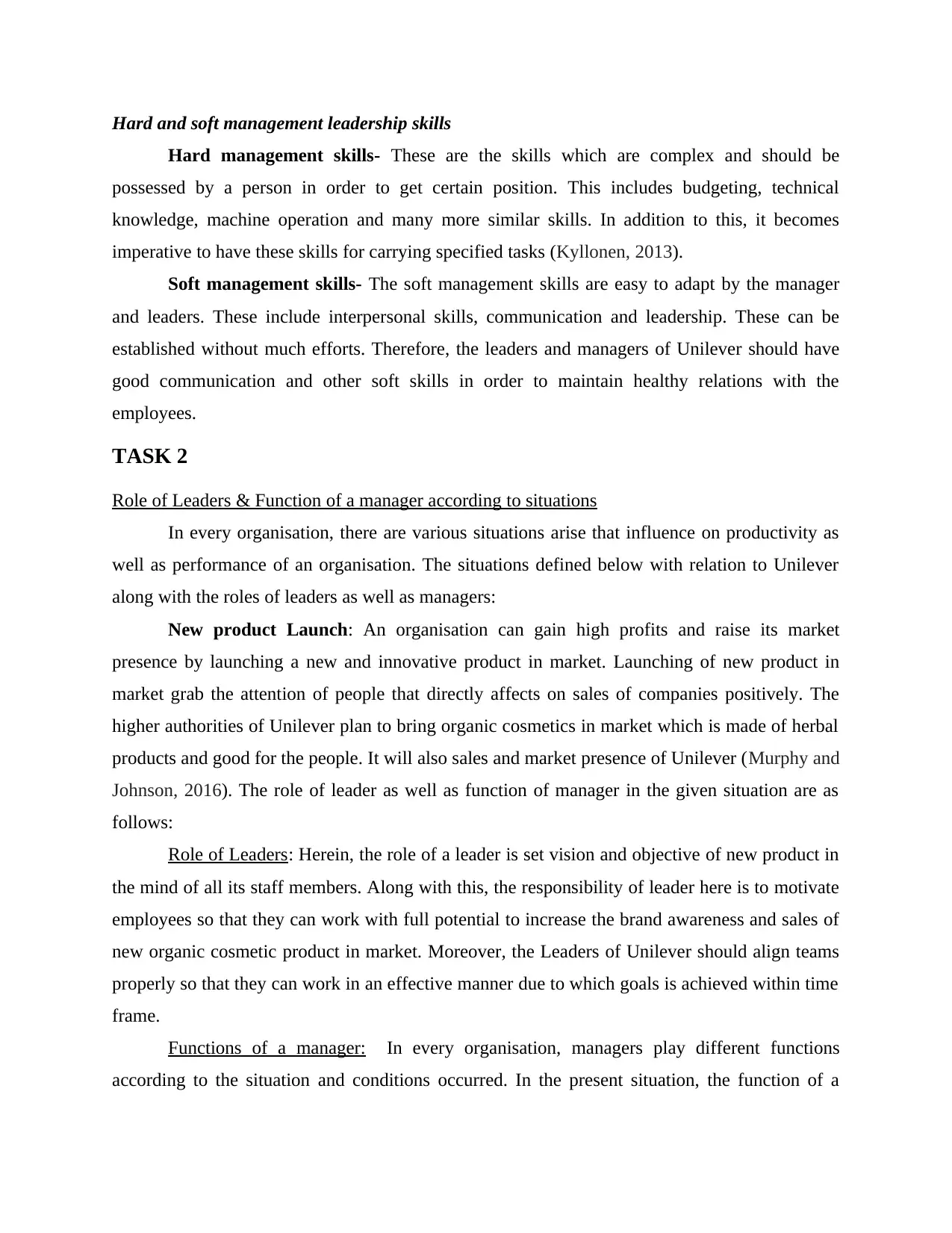
Hard and soft management leadership skills
Hard management skills- These are the skills which are complex and should be
possessed by a person in order to get certain position. This includes budgeting, technical
knowledge, machine operation and many more similar skills. In addition to this, it becomes
imperative to have these skills for carrying specified tasks (Kyllonen, 2013).
Soft management skills- The soft management skills are easy to adapt by the manager
and leaders. These include interpersonal skills, communication and leadership. These can be
established without much efforts. Therefore, the leaders and managers of Unilever should have
good communication and other soft skills in order to maintain healthy relations with the
employees.
TASK 2
Role of Leaders & Function of a manager according to situations
In every organisation, there are various situations arise that influence on productivity as
well as performance of an organisation. The situations defined below with relation to Unilever
along with the roles of leaders as well as managers:
New product Launch: An organisation can gain high profits and raise its market
presence by launching a new and innovative product in market. Launching of new product in
market grab the attention of people that directly affects on sales of companies positively. The
higher authorities of Unilever plan to bring organic cosmetics in market which is made of herbal
products and good for the people. It will also sales and market presence of Unilever (Murphy and
Johnson, 2016). The role of leader as well as function of manager in the given situation are as
follows:
Role of Leaders: Herein, the role of a leader is set vision and objective of new product in
the mind of all its staff members. Along with this, the responsibility of leader here is to motivate
employees so that they can work with full potential to increase the brand awareness and sales of
new organic cosmetic product in market. Moreover, the Leaders of Unilever should align teams
properly so that they can work in an effective manner due to which goals is achieved within time
frame.
Functions of a manager: In every organisation, managers play different functions
according to the situation and conditions occurred. In the present situation, the function of a
Hard management skills- These are the skills which are complex and should be
possessed by a person in order to get certain position. This includes budgeting, technical
knowledge, machine operation and many more similar skills. In addition to this, it becomes
imperative to have these skills for carrying specified tasks (Kyllonen, 2013).
Soft management skills- The soft management skills are easy to adapt by the manager
and leaders. These include interpersonal skills, communication and leadership. These can be
established without much efforts. Therefore, the leaders and managers of Unilever should have
good communication and other soft skills in order to maintain healthy relations with the
employees.
TASK 2
Role of Leaders & Function of a manager according to situations
In every organisation, there are various situations arise that influence on productivity as
well as performance of an organisation. The situations defined below with relation to Unilever
along with the roles of leaders as well as managers:
New product Launch: An organisation can gain high profits and raise its market
presence by launching a new and innovative product in market. Launching of new product in
market grab the attention of people that directly affects on sales of companies positively. The
higher authorities of Unilever plan to bring organic cosmetics in market which is made of herbal
products and good for the people. It will also sales and market presence of Unilever (Murphy and
Johnson, 2016). The role of leader as well as function of manager in the given situation are as
follows:
Role of Leaders: Herein, the role of a leader is set vision and objective of new product in
the mind of all its staff members. Along with this, the responsibility of leader here is to motivate
employees so that they can work with full potential to increase the brand awareness and sales of
new organic cosmetic product in market. Moreover, the Leaders of Unilever should align teams
properly so that they can work in an effective manner due to which goals is achieved within time
frame.
Functions of a manager: In every organisation, managers play different functions
according to the situation and conditions occurred. In the present situation, the function of a
⊘ This is a preview!⊘
Do you want full access?
Subscribe today to unlock all pages.

Trusted by 1+ million students worldwide
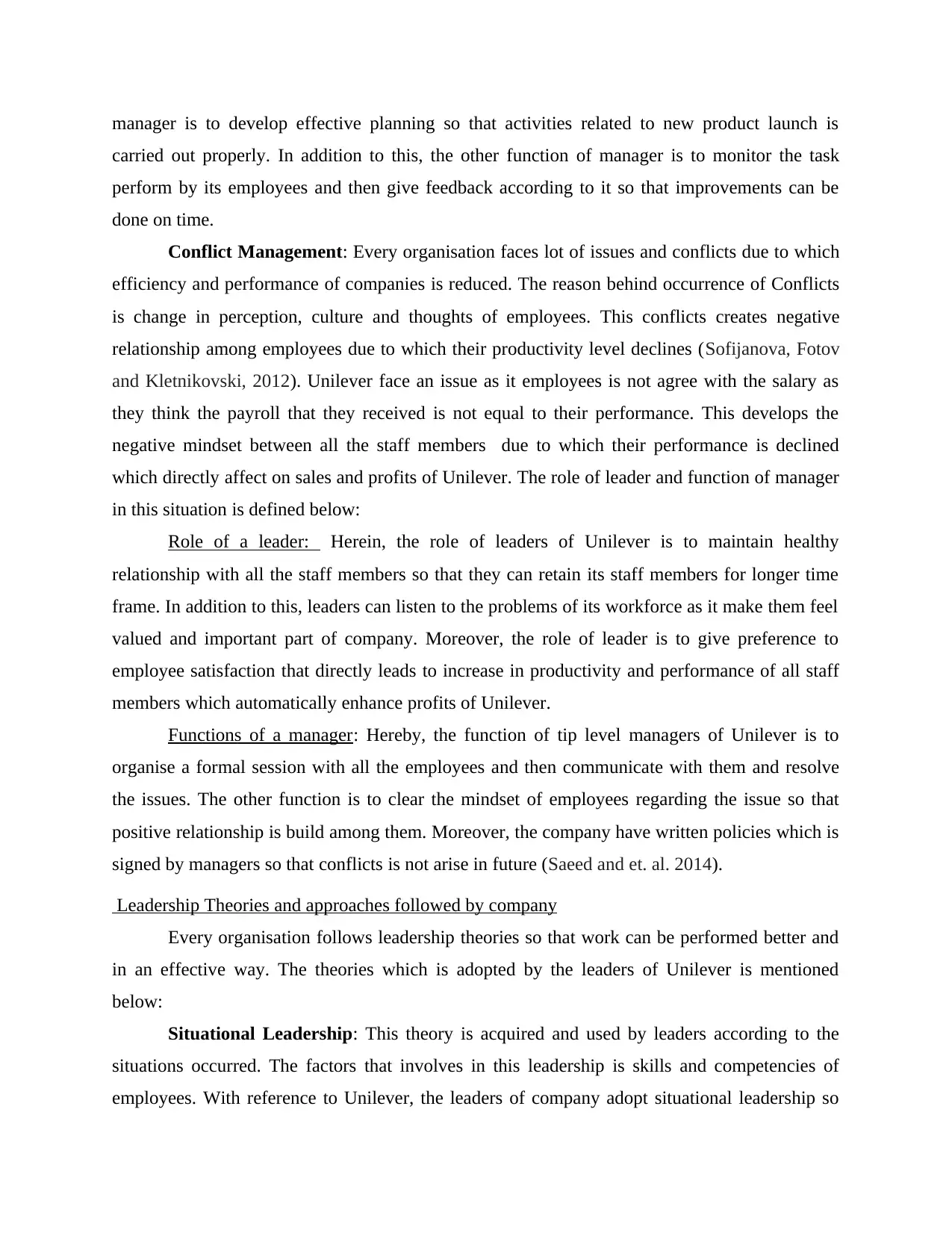
manager is to develop effective planning so that activities related to new product launch is
carried out properly. In addition to this, the other function of manager is to monitor the task
perform by its employees and then give feedback according to it so that improvements can be
done on time.
Conflict Management: Every organisation faces lot of issues and conflicts due to which
efficiency and performance of companies is reduced. The reason behind occurrence of Conflicts
is change in perception, culture and thoughts of employees. This conflicts creates negative
relationship among employees due to which their productivity level declines (Sofijanova, Fotov
and Kletnikovski, 2012). Unilever face an issue as it employees is not agree with the salary as
they think the payroll that they received is not equal to their performance. This develops the
negative mindset between all the staff members due to which their performance is declined
which directly affect on sales and profits of Unilever. The role of leader and function of manager
in this situation is defined below:
Role of a leader: Herein, the role of leaders of Unilever is to maintain healthy
relationship with all the staff members so that they can retain its staff members for longer time
frame. In addition to this, leaders can listen to the problems of its workforce as it make them feel
valued and important part of company. Moreover, the role of leader is to give preference to
employee satisfaction that directly leads to increase in productivity and performance of all staff
members which automatically enhance profits of Unilever.
Functions of a manager: Hereby, the function of tip level managers of Unilever is to
organise a formal session with all the employees and then communicate with them and resolve
the issues. The other function is to clear the mindset of employees regarding the issue so that
positive relationship is build among them. Moreover, the company have written policies which is
signed by managers so that conflicts is not arise in future (Saeed and et. al. 2014).
Leadership Theories and approaches followed by company
Every organisation follows leadership theories so that work can be performed better and
in an effective way. The theories which is adopted by the leaders of Unilever is mentioned
below:
Situational Leadership: This theory is acquired and used by leaders according to the
situations occurred. The factors that involves in this leadership is skills and competencies of
employees. With reference to Unilever, the leaders of company adopt situational leadership so
carried out properly. In addition to this, the other function of manager is to monitor the task
perform by its employees and then give feedback according to it so that improvements can be
done on time.
Conflict Management: Every organisation faces lot of issues and conflicts due to which
efficiency and performance of companies is reduced. The reason behind occurrence of Conflicts
is change in perception, culture and thoughts of employees. This conflicts creates negative
relationship among employees due to which their productivity level declines (Sofijanova, Fotov
and Kletnikovski, 2012). Unilever face an issue as it employees is not agree with the salary as
they think the payroll that they received is not equal to their performance. This develops the
negative mindset between all the staff members due to which their performance is declined
which directly affect on sales and profits of Unilever. The role of leader and function of manager
in this situation is defined below:
Role of a leader: Herein, the role of leaders of Unilever is to maintain healthy
relationship with all the staff members so that they can retain its staff members for longer time
frame. In addition to this, leaders can listen to the problems of its workforce as it make them feel
valued and important part of company. Moreover, the role of leader is to give preference to
employee satisfaction that directly leads to increase in productivity and performance of all staff
members which automatically enhance profits of Unilever.
Functions of a manager: Hereby, the function of tip level managers of Unilever is to
organise a formal session with all the employees and then communicate with them and resolve
the issues. The other function is to clear the mindset of employees regarding the issue so that
positive relationship is build among them. Moreover, the company have written policies which is
signed by managers so that conflicts is not arise in future (Saeed and et. al. 2014).
Leadership Theories and approaches followed by company
Every organisation follows leadership theories so that work can be performed better and
in an effective way. The theories which is adopted by the leaders of Unilever is mentioned
below:
Situational Leadership: This theory is acquired and used by leaders according to the
situations occurred. The factors that involves in this leadership is skills and competencies of
employees. With reference to Unilever, the leaders of company adopt situational leadership so
Paraphrase This Document
Need a fresh take? Get an instant paraphrase of this document with our AI Paraphraser
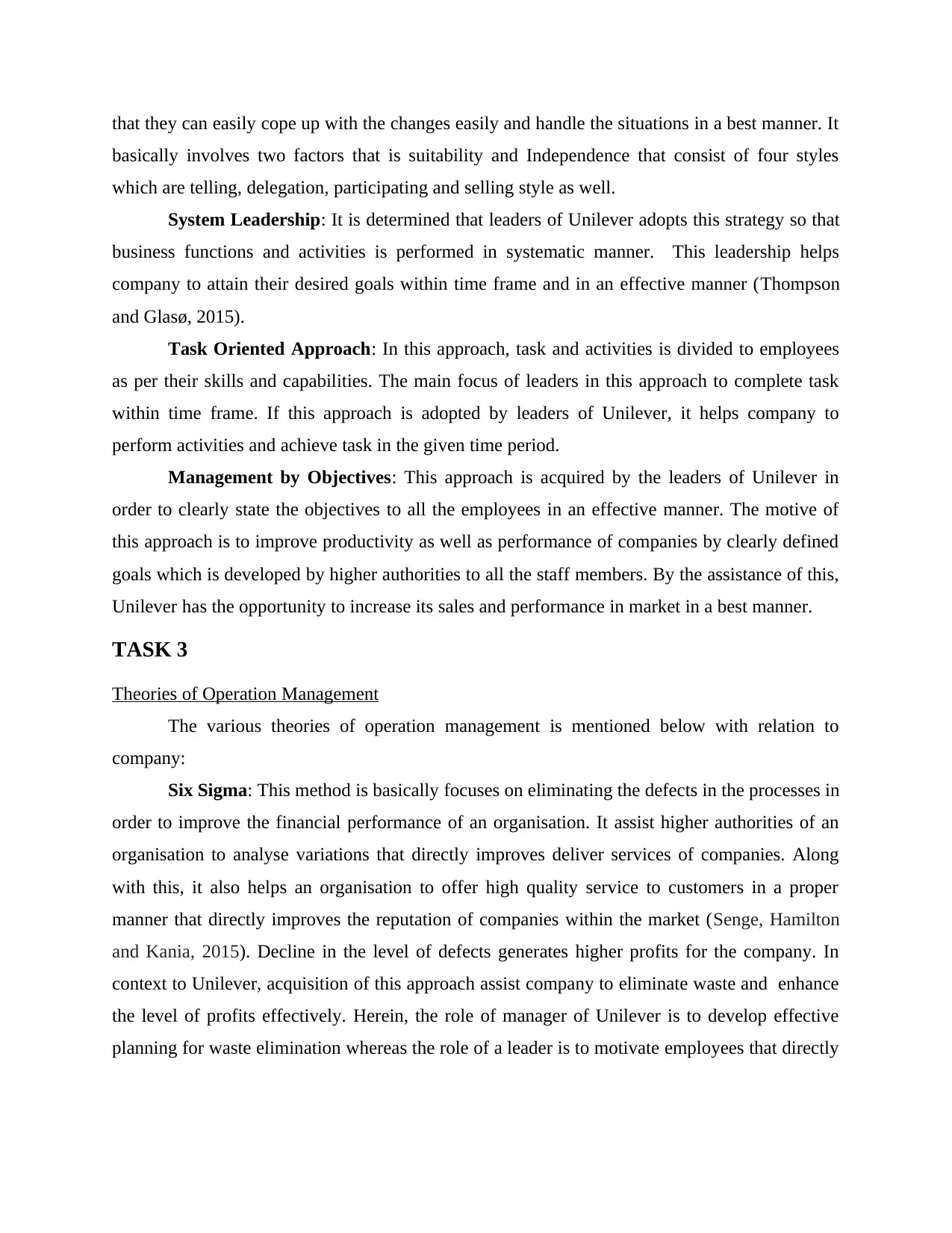
that they can easily cope up with the changes easily and handle the situations in a best manner. It
basically involves two factors that is suitability and Independence that consist of four styles
which are telling, delegation, participating and selling style as well.
System Leadership: It is determined that leaders of Unilever adopts this strategy so that
business functions and activities is performed in systematic manner. This leadership helps
company to attain their desired goals within time frame and in an effective manner (Thompson
and Glasø, 2015).
Task Oriented Approach: In this approach, task and activities is divided to employees
as per their skills and capabilities. The main focus of leaders in this approach to complete task
within time frame. If this approach is adopted by leaders of Unilever, it helps company to
perform activities and achieve task in the given time period.
Management by Objectives: This approach is acquired by the leaders of Unilever in
order to clearly state the objectives to all the employees in an effective manner. The motive of
this approach is to improve productivity as well as performance of companies by clearly defined
goals which is developed by higher authorities to all the staff members. By the assistance of this,
Unilever has the opportunity to increase its sales and performance in market in a best manner.
TASK 3
Theories of Operation Management
The various theories of operation management is mentioned below with relation to
company:
Six Sigma: This method is basically focuses on eliminating the defects in the processes in
order to improve the financial performance of an organisation. It assist higher authorities of an
organisation to analyse variations that directly improves deliver services of companies. Along
with this, it also helps an organisation to offer high quality service to customers in a proper
manner that directly improves the reputation of companies within the market (Senge, Hamilton
and Kania, 2015). Decline in the level of defects generates higher profits for the company. In
context to Unilever, acquisition of this approach assist company to eliminate waste and enhance
the level of profits effectively. Herein, the role of manager of Unilever is to develop effective
planning for waste elimination whereas the role of a leader is to motivate employees that directly
basically involves two factors that is suitability and Independence that consist of four styles
which are telling, delegation, participating and selling style as well.
System Leadership: It is determined that leaders of Unilever adopts this strategy so that
business functions and activities is performed in systematic manner. This leadership helps
company to attain their desired goals within time frame and in an effective manner (Thompson
and Glasø, 2015).
Task Oriented Approach: In this approach, task and activities is divided to employees
as per their skills and capabilities. The main focus of leaders in this approach to complete task
within time frame. If this approach is adopted by leaders of Unilever, it helps company to
perform activities and achieve task in the given time period.
Management by Objectives: This approach is acquired by the leaders of Unilever in
order to clearly state the objectives to all the employees in an effective manner. The motive of
this approach is to improve productivity as well as performance of companies by clearly defined
goals which is developed by higher authorities to all the staff members. By the assistance of this,
Unilever has the opportunity to increase its sales and performance in market in a best manner.
TASK 3
Theories of Operation Management
The various theories of operation management is mentioned below with relation to
company:
Six Sigma: This method is basically focuses on eliminating the defects in the processes in
order to improve the financial performance of an organisation. It assist higher authorities of an
organisation to analyse variations that directly improves deliver services of companies. Along
with this, it also helps an organisation to offer high quality service to customers in a proper
manner that directly improves the reputation of companies within the market (Senge, Hamilton
and Kania, 2015). Decline in the level of defects generates higher profits for the company. In
context to Unilever, acquisition of this approach assist company to eliminate waste and enhance
the level of profits effectively. Herein, the role of manager of Unilever is to develop effective
planning for waste elimination whereas the role of a leader is to motivate employees that directly
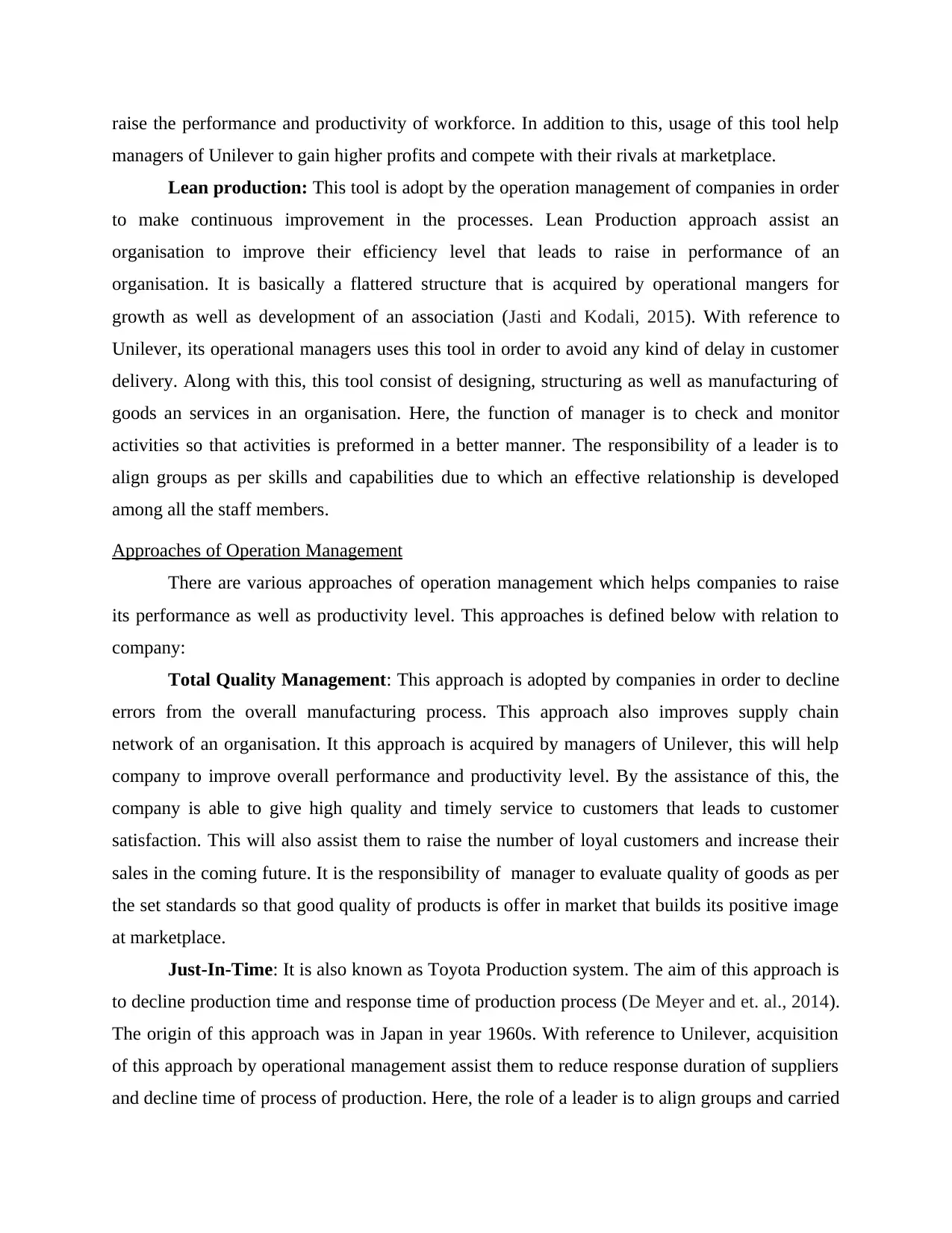
raise the performance and productivity of workforce. In addition to this, usage of this tool help
managers of Unilever to gain higher profits and compete with their rivals at marketplace.
Lean production: This tool is adopt by the operation management of companies in order
to make continuous improvement in the processes. Lean Production approach assist an
organisation to improve their efficiency level that leads to raise in performance of an
organisation. It is basically a flattered structure that is acquired by operational mangers for
growth as well as development of an association (Jasti and Kodali, 2015). With reference to
Unilever, its operational managers uses this tool in order to avoid any kind of delay in customer
delivery. Along with this, this tool consist of designing, structuring as well as manufacturing of
goods an services in an organisation. Here, the function of manager is to check and monitor
activities so that activities is preformed in a better manner. The responsibility of a leader is to
align groups as per skills and capabilities due to which an effective relationship is developed
among all the staff members.
Approaches of Operation Management
There are various approaches of operation management which helps companies to raise
its performance as well as productivity level. This approaches is defined below with relation to
company:
Total Quality Management: This approach is adopted by companies in order to decline
errors from the overall manufacturing process. This approach also improves supply chain
network of an organisation. It this approach is acquired by managers of Unilever, this will help
company to improve overall performance and productivity level. By the assistance of this, the
company is able to give high quality and timely service to customers that leads to customer
satisfaction. This will also assist them to raise the number of loyal customers and increase their
sales in the coming future. It is the responsibility of manager to evaluate quality of goods as per
the set standards so that good quality of products is offer in market that builds its positive image
at marketplace.
Just-In-Time: It is also known as Toyota Production system. The aim of this approach is
to decline production time and response time of production process (De Meyer and et. al., 2014).
The origin of this approach was in Japan in year 1960s. With reference to Unilever, acquisition
of this approach by operational management assist them to reduce response duration of suppliers
and decline time of process of production. Here, the role of a leader is to align groups and carried
managers of Unilever to gain higher profits and compete with their rivals at marketplace.
Lean production: This tool is adopt by the operation management of companies in order
to make continuous improvement in the processes. Lean Production approach assist an
organisation to improve their efficiency level that leads to raise in performance of an
organisation. It is basically a flattered structure that is acquired by operational mangers for
growth as well as development of an association (Jasti and Kodali, 2015). With reference to
Unilever, its operational managers uses this tool in order to avoid any kind of delay in customer
delivery. Along with this, this tool consist of designing, structuring as well as manufacturing of
goods an services in an organisation. Here, the function of manager is to check and monitor
activities so that activities is preformed in a better manner. The responsibility of a leader is to
align groups as per skills and capabilities due to which an effective relationship is developed
among all the staff members.
Approaches of Operation Management
There are various approaches of operation management which helps companies to raise
its performance as well as productivity level. This approaches is defined below with relation to
company:
Total Quality Management: This approach is adopted by companies in order to decline
errors from the overall manufacturing process. This approach also improves supply chain
network of an organisation. It this approach is acquired by managers of Unilever, this will help
company to improve overall performance and productivity level. By the assistance of this, the
company is able to give high quality and timely service to customers that leads to customer
satisfaction. This will also assist them to raise the number of loyal customers and increase their
sales in the coming future. It is the responsibility of manager to evaluate quality of goods as per
the set standards so that good quality of products is offer in market that builds its positive image
at marketplace.
Just-In-Time: It is also known as Toyota Production system. The aim of this approach is
to decline production time and response time of production process (De Meyer and et. al., 2014).
The origin of this approach was in Japan in year 1960s. With reference to Unilever, acquisition
of this approach by operational management assist them to reduce response duration of suppliers
and decline time of process of production. Here, the role of a leader is to align groups and carried
⊘ This is a preview!⊘
Do you want full access?
Subscribe today to unlock all pages.

Trusted by 1+ million students worldwide
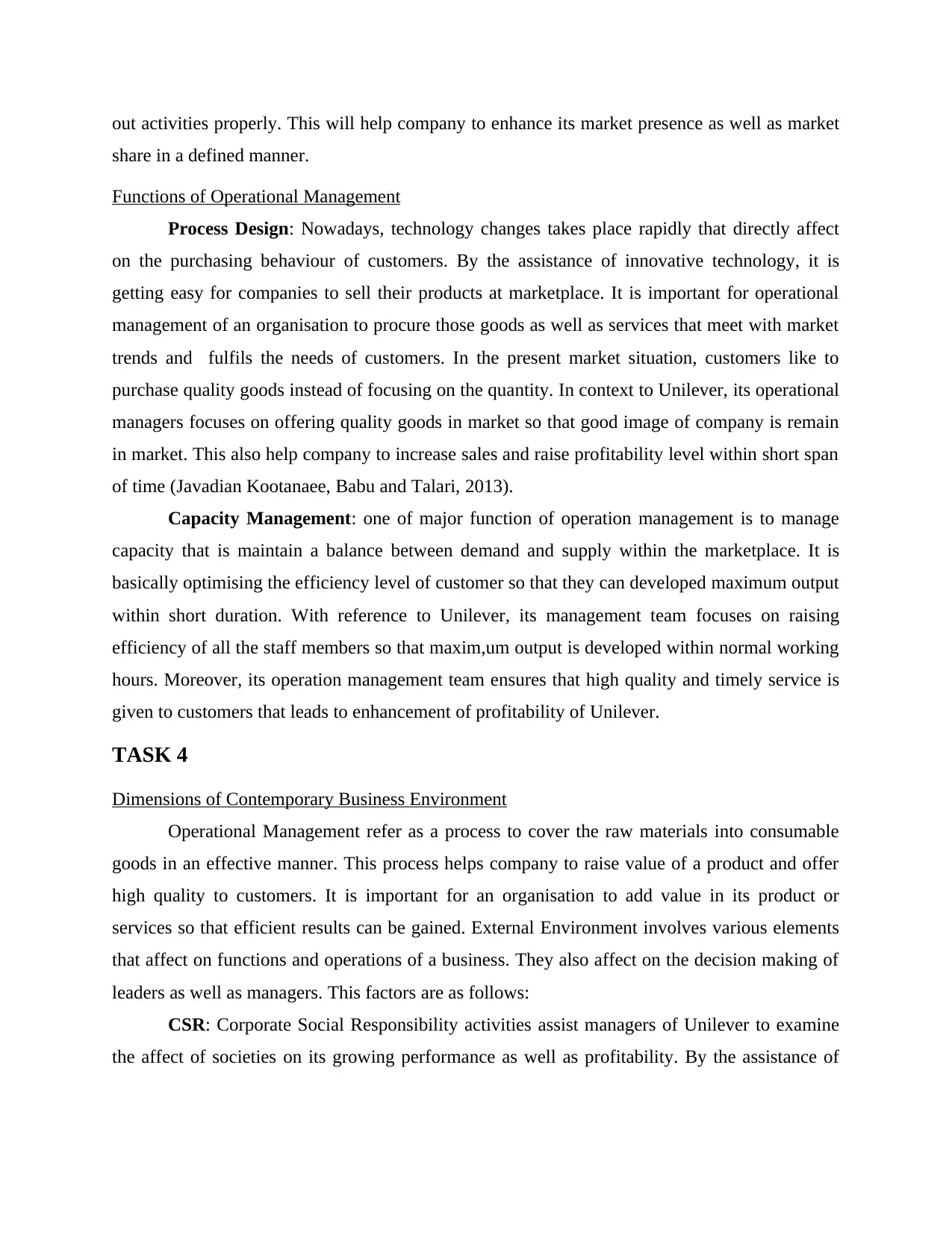
out activities properly. This will help company to enhance its market presence as well as market
share in a defined manner.
Functions of Operational Management
Process Design: Nowadays, technology changes takes place rapidly that directly affect
on the purchasing behaviour of customers. By the assistance of innovative technology, it is
getting easy for companies to sell their products at marketplace. It is important for operational
management of an organisation to procure those goods as well as services that meet with market
trends and fulfils the needs of customers. In the present market situation, customers like to
purchase quality goods instead of focusing on the quantity. In context to Unilever, its operational
managers focuses on offering quality goods in market so that good image of company is remain
in market. This also help company to increase sales and raise profitability level within short span
of time (Javadian Kootanaee, Babu and Talari, 2013).
Capacity Management: one of major function of operation management is to manage
capacity that is maintain a balance between demand and supply within the marketplace. It is
basically optimising the efficiency level of customer so that they can developed maximum output
within short duration. With reference to Unilever, its management team focuses on raising
efficiency of all the staff members so that maxim,um output is developed within normal working
hours. Moreover, its operation management team ensures that high quality and timely service is
given to customers that leads to enhancement of profitability of Unilever.
TASK 4
Dimensions of Contemporary Business Environment
Operational Management refer as a process to cover the raw materials into consumable
goods in an effective manner. This process helps company to raise value of a product and offer
high quality to customers. It is important for an organisation to add value in its product or
services so that efficient results can be gained. External Environment involves various elements
that affect on functions and operations of a business. They also affect on the decision making of
leaders as well as managers. This factors are as follows:
CSR: Corporate Social Responsibility activities assist managers of Unilever to examine
the affect of societies on its growing performance as well as profitability. By the assistance of
share in a defined manner.
Functions of Operational Management
Process Design: Nowadays, technology changes takes place rapidly that directly affect
on the purchasing behaviour of customers. By the assistance of innovative technology, it is
getting easy for companies to sell their products at marketplace. It is important for operational
management of an organisation to procure those goods as well as services that meet with market
trends and fulfils the needs of customers. In the present market situation, customers like to
purchase quality goods instead of focusing on the quantity. In context to Unilever, its operational
managers focuses on offering quality goods in market so that good image of company is remain
in market. This also help company to increase sales and raise profitability level within short span
of time (Javadian Kootanaee, Babu and Talari, 2013).
Capacity Management: one of major function of operation management is to manage
capacity that is maintain a balance between demand and supply within the marketplace. It is
basically optimising the efficiency level of customer so that they can developed maximum output
within short duration. With reference to Unilever, its management team focuses on raising
efficiency of all the staff members so that maxim,um output is developed within normal working
hours. Moreover, its operation management team ensures that high quality and timely service is
given to customers that leads to enhancement of profitability of Unilever.
TASK 4
Dimensions of Contemporary Business Environment
Operational Management refer as a process to cover the raw materials into consumable
goods in an effective manner. This process helps company to raise value of a product and offer
high quality to customers. It is important for an organisation to add value in its product or
services so that efficient results can be gained. External Environment involves various elements
that affect on functions and operations of a business. They also affect on the decision making of
leaders as well as managers. This factors are as follows:
CSR: Corporate Social Responsibility activities assist managers of Unilever to examine
the affect of societies on its growing performance as well as profitability. By the assistance of
Paraphrase This Document
Need a fresh take? Get an instant paraphrase of this document with our AI Paraphraser
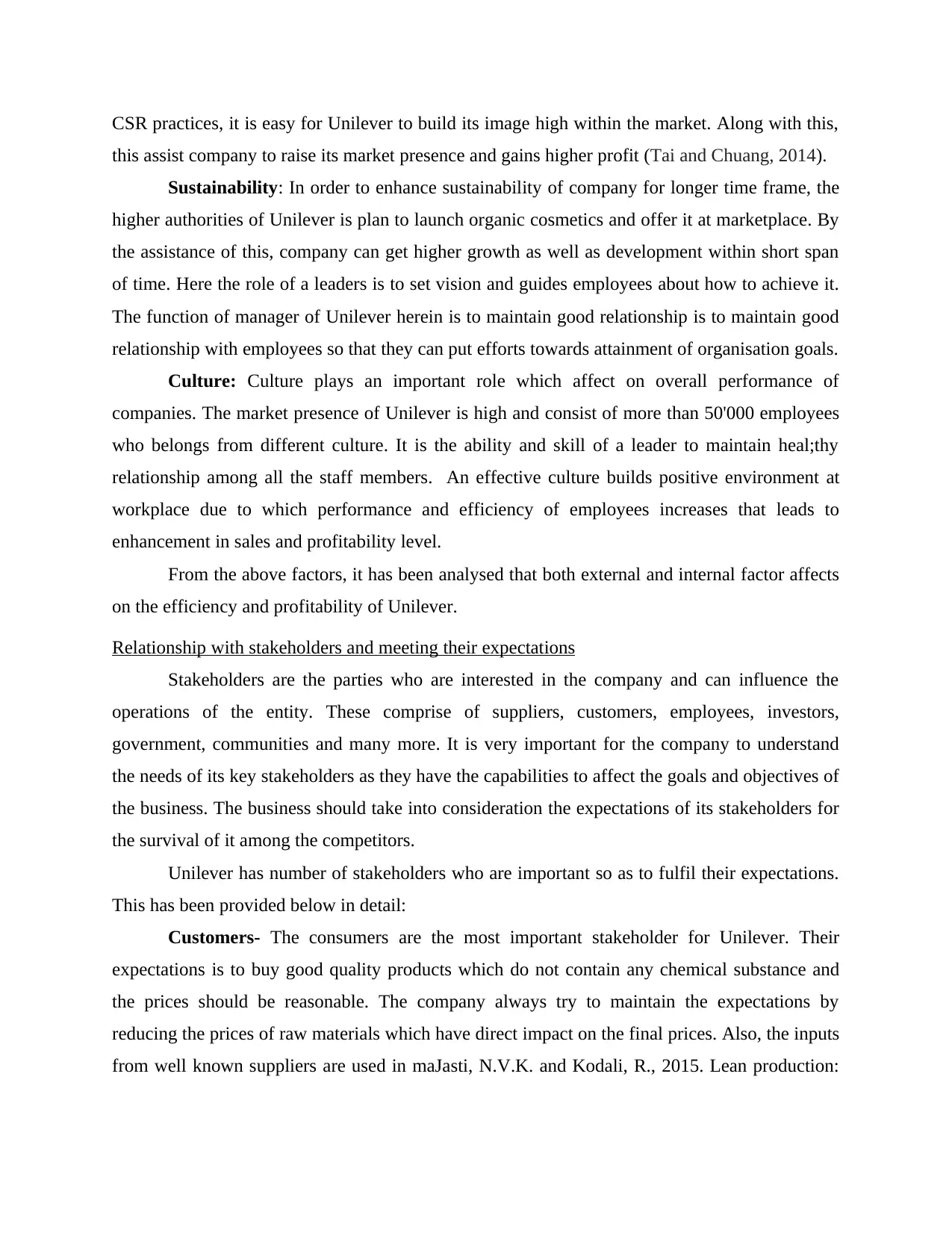
CSR practices, it is easy for Unilever to build its image high within the market. Along with this,
this assist company to raise its market presence and gains higher profit (Tai and Chuang, 2014).
Sustainability: In order to enhance sustainability of company for longer time frame, the
higher authorities of Unilever is plan to launch organic cosmetics and offer it at marketplace. By
the assistance of this, company can get higher growth as well as development within short span
of time. Here the role of a leaders is to set vision and guides employees about how to achieve it.
The function of manager of Unilever herein is to maintain good relationship is to maintain good
relationship with employees so that they can put efforts towards attainment of organisation goals.
Culture: Culture plays an important role which affect on overall performance of
companies. The market presence of Unilever is high and consist of more than 50'000 employees
who belongs from different culture. It is the ability and skill of a leader to maintain heal;thy
relationship among all the staff members. An effective culture builds positive environment at
workplace due to which performance and efficiency of employees increases that leads to
enhancement in sales and profitability level.
From the above factors, it has been analysed that both external and internal factor affects
on the efficiency and profitability of Unilever.
Relationship with stakeholders and meeting their expectations
Stakeholders are the parties who are interested in the company and can influence the
operations of the entity. These comprise of suppliers, customers, employees, investors,
government, communities and many more. It is very important for the company to understand
the needs of its key stakeholders as they have the capabilities to affect the goals and objectives of
the business. The business should take into consideration the expectations of its stakeholders for
the survival of it among the competitors.
Unilever has number of stakeholders who are important so as to fulfil their expectations.
This has been provided below in detail:
Customers- The consumers are the most important stakeholder for Unilever. Their
expectations is to buy good quality products which do not contain any chemical substance and
the prices should be reasonable. The company always try to maintain the expectations by
reducing the prices of raw materials which have direct impact on the final prices. Also, the inputs
from well known suppliers are used in maJasti, N.V.K. and Kodali, R., 2015. Lean production:
this assist company to raise its market presence and gains higher profit (Tai and Chuang, 2014).
Sustainability: In order to enhance sustainability of company for longer time frame, the
higher authorities of Unilever is plan to launch organic cosmetics and offer it at marketplace. By
the assistance of this, company can get higher growth as well as development within short span
of time. Here the role of a leaders is to set vision and guides employees about how to achieve it.
The function of manager of Unilever herein is to maintain good relationship is to maintain good
relationship with employees so that they can put efforts towards attainment of organisation goals.
Culture: Culture plays an important role which affect on overall performance of
companies. The market presence of Unilever is high and consist of more than 50'000 employees
who belongs from different culture. It is the ability and skill of a leader to maintain heal;thy
relationship among all the staff members. An effective culture builds positive environment at
workplace due to which performance and efficiency of employees increases that leads to
enhancement in sales and profitability level.
From the above factors, it has been analysed that both external and internal factor affects
on the efficiency and profitability of Unilever.
Relationship with stakeholders and meeting their expectations
Stakeholders are the parties who are interested in the company and can influence the
operations of the entity. These comprise of suppliers, customers, employees, investors,
government, communities and many more. It is very important for the company to understand
the needs of its key stakeholders as they have the capabilities to affect the goals and objectives of
the business. The business should take into consideration the expectations of its stakeholders for
the survival of it among the competitors.
Unilever has number of stakeholders who are important so as to fulfil their expectations.
This has been provided below in detail:
Customers- The consumers are the most important stakeholder for Unilever. Their
expectations is to buy good quality products which do not contain any chemical substance and
the prices should be reasonable. The company always try to maintain the expectations by
reducing the prices of raw materials which have direct impact on the final prices. Also, the inputs
from well known suppliers are used in maJasti, N.V.K. and Kodali, R., 2015. Lean production:
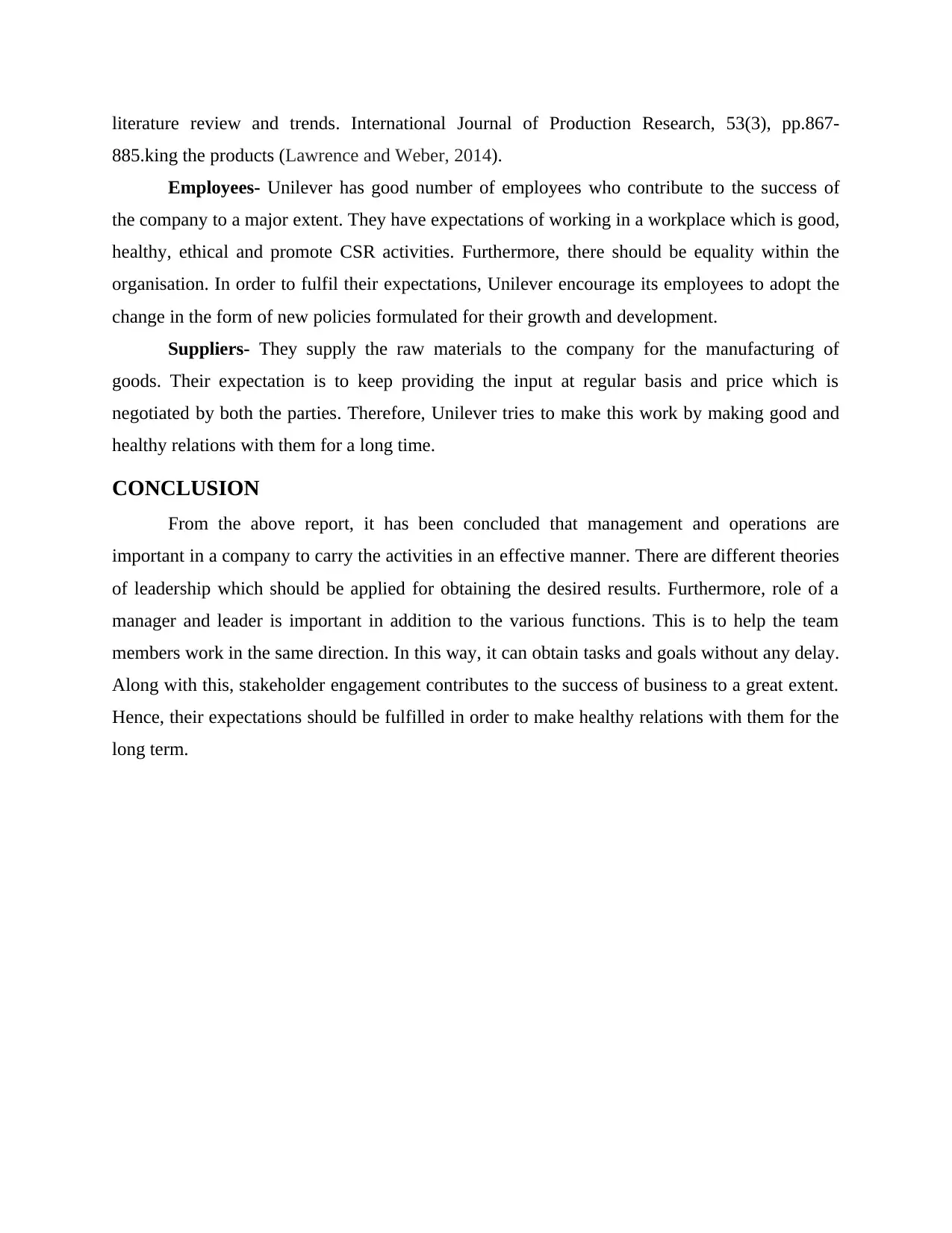
literature review and trends. International Journal of Production Research, 53(3), pp.867-
885.king the products (Lawrence and Weber, 2014).
Employees- Unilever has good number of employees who contribute to the success of
the company to a major extent. They have expectations of working in a workplace which is good,
healthy, ethical and promote CSR activities. Furthermore, there should be equality within the
organisation. In order to fulfil their expectations, Unilever encourage its employees to adopt the
change in the form of new policies formulated for their growth and development.
Suppliers- They supply the raw materials to the company for the manufacturing of
goods. Their expectation is to keep providing the input at regular basis and price which is
negotiated by both the parties. Therefore, Unilever tries to make this work by making good and
healthy relations with them for a long time.
CONCLUSION
From the above report, it has been concluded that management and operations are
important in a company to carry the activities in an effective manner. There are different theories
of leadership which should be applied for obtaining the desired results. Furthermore, role of a
manager and leader is important in addition to the various functions. This is to help the team
members work in the same direction. In this way, it can obtain tasks and goals without any delay.
Along with this, stakeholder engagement contributes to the success of business to a great extent.
Hence, their expectations should be fulfilled in order to make healthy relations with them for the
long term.
885.king the products (Lawrence and Weber, 2014).
Employees- Unilever has good number of employees who contribute to the success of
the company to a major extent. They have expectations of working in a workplace which is good,
healthy, ethical and promote CSR activities. Furthermore, there should be equality within the
organisation. In order to fulfil their expectations, Unilever encourage its employees to adopt the
change in the form of new policies formulated for their growth and development.
Suppliers- They supply the raw materials to the company for the manufacturing of
goods. Their expectation is to keep providing the input at regular basis and price which is
negotiated by both the parties. Therefore, Unilever tries to make this work by making good and
healthy relations with them for a long time.
CONCLUSION
From the above report, it has been concluded that management and operations are
important in a company to carry the activities in an effective manner. There are different theories
of leadership which should be applied for obtaining the desired results. Furthermore, role of a
manager and leader is important in addition to the various functions. This is to help the team
members work in the same direction. In this way, it can obtain tasks and goals without any delay.
Along with this, stakeholder engagement contributes to the success of business to a great extent.
Hence, their expectations should be fulfilled in order to make healthy relations with them for the
long term.
⊘ This is a preview!⊘
Do you want full access?
Subscribe today to unlock all pages.

Trusted by 1+ million students worldwide
1 out of 13
Related Documents
Your All-in-One AI-Powered Toolkit for Academic Success.
+13062052269
info@desklib.com
Available 24*7 on WhatsApp / Email
![[object Object]](/_next/static/media/star-bottom.7253800d.svg)
Unlock your academic potential
Copyright © 2020–2026 A2Z Services. All Rights Reserved. Developed and managed by ZUCOL.




